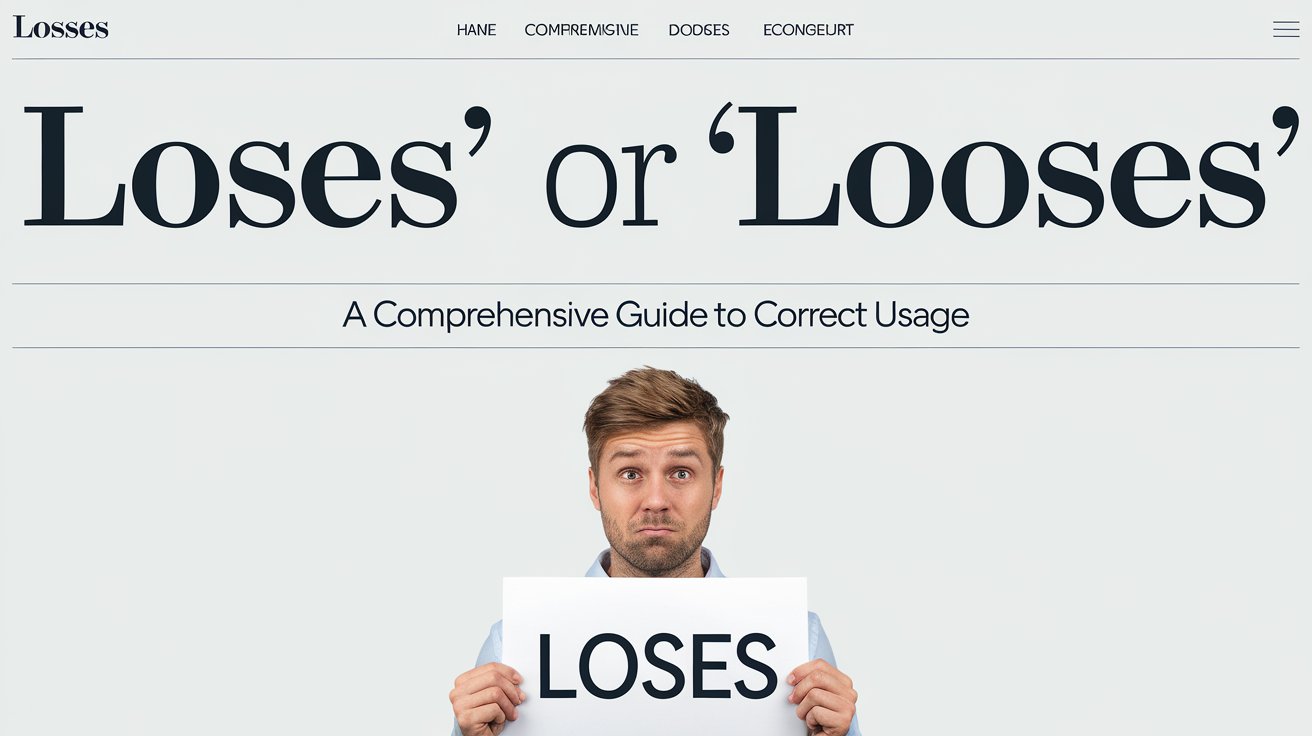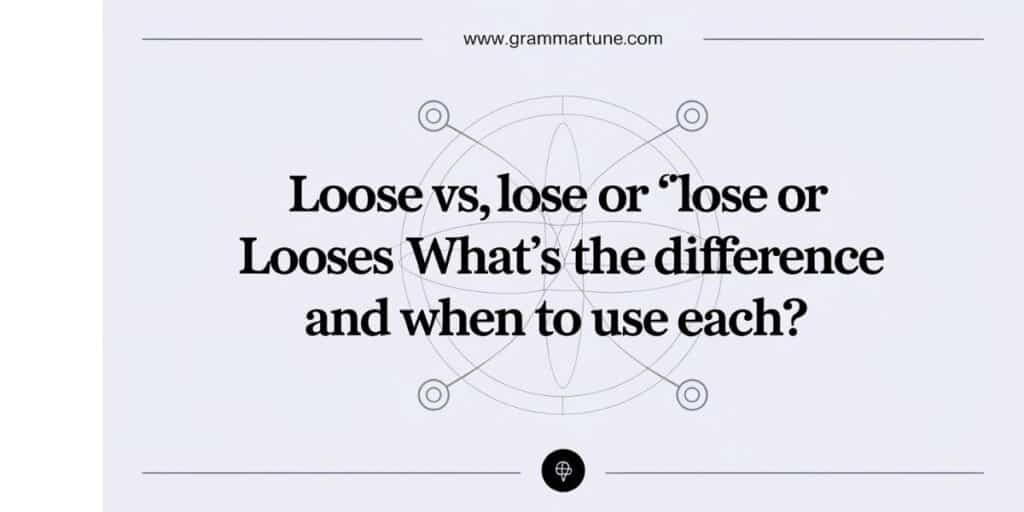Understanding the differences between “loose” vs “lose”, or “loses” vs “looses” is crucial for clear and effective communication. These words may sound similar, but their meanings and uses are distinct.
“Loose” describes something that is not tight or free, while “lose” refers to experiencing a loss or misplacing something. Similarly, “loses” (the third-person form of “lose”) is used when someone or something is unsuccessful, and “looses” means to release or set free.
Misusing these terms is a common error, but with the right understanding, it’s easy to avoid mistakes. This guide provides clarity on their meanings, proper usage, and spelling to ensure your writing stays professional and error-free.
“Loses” or “Looses”: Why the Confusion?

The mix-up between “loses” and “looses” often stems from their similar pronunciation. In the context of your article, “Loose vs Lose: What’s the Difference and When to Use Each?,” it’s essential to note that “loses” means experiencing a loss, while “looses” means to release or set free. Understanding these differences ensures clear communication and avoids common errors.
Examples
Certainly! Here are examples to highlight the correct usage of “loses” and “looses”:
“Loses” (verb: to experience a loss or be unsuccessful):
Sarah always loses her glasses and spends hours looking for them.
The team loses every time they play against their strongest rival.
“Looses” (verb: to release or set free, though less commonly used):
The hunter looses his arrow, aiming straight at the target.
She looses her grip on the rope, letting it fall to the ground.
Loses vs. Looses: The Synonyms
While “loses” and “looses” may seem related, they are not exact synonyms due to their distinct meanings and uses. However, they each connect to certain terms:
Synonyms for “loses”: Misplaces, forfeits, fails, or suffers a loss. For example, “She loses her keys” relates to “misplaces.”
Synonyms for “looses”: Releases, frees, or unleashes. For example, “He looses the dogs” aligns with “releases.”
looses or loses meaning
Here’s a breakdown of the meanings of “loses” and “looses”:
“Loses”: This is a verb that means to experience a loss, fail to retain something, or be defeated. For example:
- She always loses her keys.
- The team loses every game.
“Looses”: This is also a verb but far less commonly used in modern English. It means to release, set free, or let something loose. For example:
- He looses the dogs into the field.
- The archer looses his arrow.
The difference lies in their meanings and contexts—“loses” relates to loss, while “looses” involves releasing or freeing something.
“Loses” or “Looses”: A Comprehensive Guide to Correct Usage

The difference between “loses” and “looses” can be tricky, but understanding their meanings and contexts makes it simple.
“Loses” relates to experiencing a loss or being unsuccessful, while “looses” means to release or set free.
This guide tackles common questions like “She loses or looses?” and “He loses or looses?”
It also explains grammar rules, provides examples, and clears up spelling confusion to ensure you always choose the right word.
Whether it’s “it loses or looses,” or another variation, you’ll never be in doubt again.
Which Is The Correct “loses Or looses”
The correct word depends on the context:
Use “loses” when referring to experiencing a loss or being unsuccessful. For example:
- She loses her keys often.
- The team loses the match.
Use “looses” when referring to releasing or setting free, though this is a less common and more formal usage. For example:
- He looses the horses into the field.
- The archer looses the arrow.
In most modern contexts, “loses” is the term you’re likely to need.
When To Use “loses or looses”
Here’s when to use “loses” and “looses”:
“Loses”: Use this when someone experiences a loss, is unsuccessful, or misplaces something. For example:
- She always loses her wallet.
- If the team loses, they are eliminated.
“Looses”: Use this when referring to releasing, setting free, or loosening something. Though it’s less commonly used in modern English, here are examples:
- The captain looses the sails to catch the wind.
- He looses his grip on the rope.
In most everyday situations, “loses” is the word you’ll use.
He looses Or loses
The correct phrase depends on the context:
“He loses”: Use this when referring to experiencing a loss, being unsuccessful, or misplacing something. For example:
- He loses his wallet frequently.
- He loses every time they play chess.
“He looses”: Use this when referring to releasing, setting free, or letting something loose. This is a less common and more formal usage. For example:
- He looses the dogs to let them roam.
- He looses the rope and allows the boat to drift.
In most modern contexts, “he loses” is what you’ll likely need.
Spelling loses or looses: Is It looses Or loses, Or It loses Or It looses ?
The correct spelling depends on the context:
“Loses”: This is the right word when referring to experiencing a loss, being unsuccessful, or misplacing something. For example:
- She loses her phone often.
- The team loses every game.
“Looses”: This is correct when talking about releasing, setting free, or letting something loose. For example:
- He looses the horses from the stable.
- The archer looses his arrow at the target.
In most modern scenarios, “loses” is more common. Understanding their distinct meanings helps in choosing the right word.
“It loses”: Use this when something experiences a loss, misplaces something, or fails to achieve success. For example:
- If the machine overheats, it loses efficiency.
- It loses power whenever there’s a storm.
“It looses”: Use this when referring to releasing or setting something free. However, this usage is rare in modern English. For example:
- It looses the grip on the rope as the tension reduces.
- The device looses the spring mechanism.
In most cases, “it loses” is the correct choice for everyday usage.
“Loses” or “Looses”: Spelling
When it comes to spelling, knowing the correct context is key:
“Loses”: This is the correct spelling when referring to experiencing a loss or being unsuccessful. For example:
- She always loses her phone.
- The team loses every match.
“Looses”: This spelling is correct when referring to releasing, letting go, or setting free, though it’s far less common in modern usage. For example:
- He looses the arrow from his bow.
- She looses the horses into the field.
Focusing on the meaning behind the word ensures you choose the correct spelling.
“Loses” or “Looses”: What’s the Difference?
“Loses” and “looses” differ significantly in meaning and usage:
“Loses”: This is the third-person singular form of the verb “lose”, meaning to experience a loss, misplace something, or be unsuccessful. For example:
- She loses her phone every week.
- The team loses the championship.
“Looses”: This is a less common verb, meaning to release, set free, or untie. It’s often used in formal or archaic contexts. For example:
- The knight looses the arrow from his bow.
- He looses the dogs into the field.
Understanding their distinct meanings ensures proper use in writing and speech.
Common Errors with “Loose” and “Lose”
The confusion between “Loose” and “Lose” arises frequently because they sound similar but have distinct meanings. “Loose” is used as an adjective for something not tight or free, while “Lose” is a verb meaning to experience a loss.
Understanding their definitions and correct usage is key to avoiding common writing mistakes. This clarity ensures your communication remains professional and error-free.
Lose vs. Loose: What’s the Difference?
“Lose” would be to misplace something or not manage to keep something. For example, “Everyone always loses their keys!”
“Loose” refers to something that is not tight-tied or closed. It may prove to be very uncomfortable to have a loose shirt.
Must read: Metaphor vs Hyperbole: Explained with Examples
Loose vs. Lose Examples
I often lose track of time.
My pants are way too loose now that I’ve lost weight.
Loose vs. Lose – How to Remember Which is Correct
Think of lose as something you want to lose — like an item or opportunity.
If it’s something that’s not tightly held, like a button, it’s loose.
Loose vs. Lose: The Definitions
Misplacing or failing to keep one’s hands on is what lose refers to.
Loose is kept aside for describing anything being free or loosely snug.
Loose vs. Lose: The Synonyms
For lose, consider synonyms like misplace or forfeit.
For loose, think of terms like free, slack, or relaxed.
Loose vs. Lose: In a Sentence
“When I lose my wallet, that’s when I start hating it!”. “My shoes are not fitting and very loose’.
I hate it when I lose my wallet.” “My shoes are very loose and not fit.”
Want to Learn More About Commonly Confused Words?
Many words from the huge dictionary sometimes cause much confusion. 🔝To avoid any silly mistakes, make sure to check out some articles.
It allows you to learn to develop confidence in writing through ensuring perfection. And, you must be ready with all your grammatical tools to highly bring that confidence into the arena of doing all the required things just as authoritatively. 📚
Why Is There Confusion Between Loose vs. Lose?
They sound similar, yet “loose” and “lose” mean something entirely else. Just look at how that common misconfusion might throw off even a seasoned writer!
This rule usually does apply to both of these terms as they tend to flaunt their usage in everyday talk without much concern for their proper context.
What Does the Word “Loose” Mean?
Loose refers to something not tightly fixed or free-moving. Think of it as being relaxed or not bound with tension.
For example, a loose dress would hang off your body with no tightness. 👗
What Does the Word “Lose” Mean?
If you misplace objects, from toys and gadgets to belongings and possessions, by carelessness or inattention, these objects not found are called “lost.” For example, if you lose your keys, they’re gone and you can’t find them! 🔑
Part of Speech
Essentially both “loose” and “lose” are nouns and verbs but in different ways. In general, loose is used as an adjective that describes the condition of being free or loose, while ‘lose’ is a verb that describes the action of misplacing or of not holding something. 📝
Meaning and Usage
The meaning of loose is clear: something is not firmly held in place. It’s commonly used to describe objects or even behavior.
Lose, however, describes an action of not keeping something or failing to have it anymore. Both are often used in day-to-day language but in different contexts. 🔄
Examples in Context
- These would be some simple examples:
- She wore those shoes so loose, she could barely walk in them.
- Link: ‘If I lose my phone, I would be in trouble.’
Examples of “Loose”
- Loose describes something that is not tightly held together. The dog has a loose collar, so it keeps slipping off. The hair has fallen loosely against her face, blowing in the wind as she ran. Both describe things that are not tightly held together. 🐶💨
The Examples of “Lose”
- “When I’m in a book, I always forget the time.” “Did you lose your wallet at the concert last night?” These are instances where something is no longer in someone’s possession. ⏳💸
Origins of Loose and Lose
Both have Old English roots but travel in different directions. Loose comes from the word “losian,” meaning to loosen; it is about something becoming free. Lose also comes from “losian,” but its meaning relates to losing or destroying. 🏺
Origins of “Loose”
The term “loose” has always been in the English language, for centuries now. The word traces its source to an Old French form “los,” free or unbound.
This seems to be something that, since forever, has been used in English to describe something that is not confined or restrained. 🌍
You will like: What’s the Plural of Syllabus? Syllabuses or Syllabi?
Origins of “Lose”
The etymology of the term “lose” is from Old English “losian” with reference to loss or destruction of something. It has always been associated with losing something or failing to keep it. 🕰️
Side-by-Side Comparison: Loose vs Lose
| Loose | Lose |
| Describes something free or unconfined | Describes the action of misplacing or no longer having something |
| Example: “My pants are loose.” | Example: “I don’t want to lose my keys!” |
This lucid comparison speaks of just how big the difference is even given the similarity in words. 📚✨
You will like: Understanding How “Run” Changes in the Past and Past Participle
Conclusion
In this way, it becomes vital to perceive Loose vs Lose: What’s the Difference and When to Use Each? to communicate clearly. Though these words may have the same sound, they carry different meanings-loose connotes not tight or secure, while lose refers to the act of placing something or no longer having it.
The context assists in avoiding possible confusion and, with practice, helps to develop one’s writing skills. So mastering the quick trick of differentiating the two words would greatly bolster one’s confidence and accuracy.
FAQ,S
What really sets apart the word “loose” from that of “lose”?
Loose has to do with a condition of something that is not tight or fastened while lose means failing to keep or mislay something. They sound the same but have very different meanings.
“Lose” Cannot Be Used As An Adjective?
This becomes a general-verb-not-an-adjective-oops-try-again kind of question. So, the action of losing is when you lose your keys. Loose: that is your adjective describing things that are not tight
How can I remember the difference between “loose” and “lose”?
To remember, think of the “o” in “lose” like a missing object. “Loose”, with two o’s, can remind you of something that is too free or unbound.
Is there a method whereby one can avoid the confusion between “loose” and “lose”?
Yes! Context makes the difference: if you mean something is not tight or secure, you will use loose; if you mean to misplace something, you would use loose. Practice makes perfect!
Can you give me an example of each word in a sentence?
Sure!
- Loose: “My shoes are too loose; I need to tighten the laces.”
- Lose: “If I lose my phone, I’ll be late to my meeting.”
Why do these words sound so similar?
Both “loose” and “lose” originate from the same Old English word “losian,” but they developed different meanings over time. Their similar sounds cause confusion today.
Are there any synonyms for “loose” and “lose”?
Yes! For loose, you could use “unfastened” or “slack.” For lose, synonyms include “misplace,” “forfeit,” or “fail to keep.

Joulia, a seasoned wordsmith and grammar enthusiast, brings over a decade of blogging expertise to Grammar Tune. With a keen eye for linguistic precision and a passion for making complex grammar concepts accessible, he has helped thousands of readers enhance their writing skills. His engaging teaching style and practical approach to language learning have made him a trusted voice in the online grammar community.







